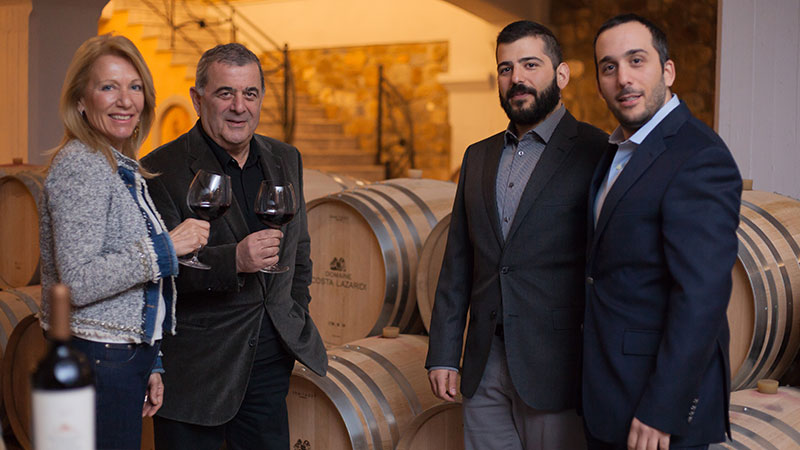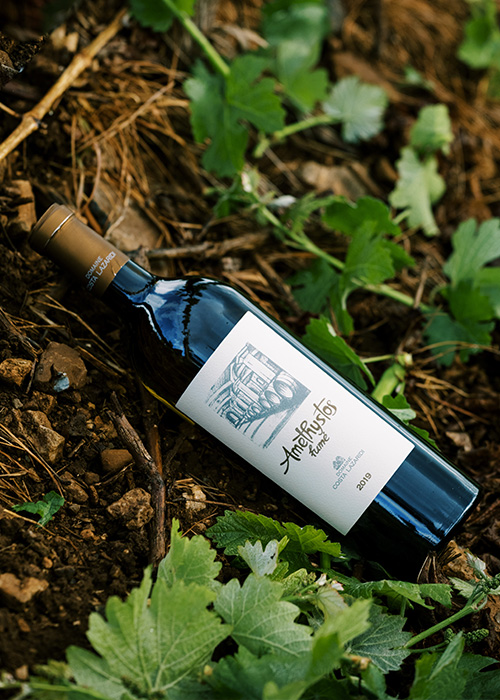
When Costas Lazaridis first came to Drama, there wasn’t a single vineyard.
The city in mainland Greece was known for its many commercial and military pursuits since the classical era, but wine wasn’t one of them.
That’s a very different story today. Costas Lazaridis developed Drama’s now-blossoming wine industry and along the way, a pertinent discovery bridged the ancient world with the modern one.
Costas Lazaridis got his start in the ’60s when he ran the German branch of the family marble business for 20 years. There, he found his affinity for international varieties of grapes, like Sauvignon Blanc and Cabernet Sauvignon. He wanted to see how those grapes fared in his native Greece and estimated the Drama area’s microclimate, created by three mountains and two rivers, would provide the best growing conditions for his beloved European grapes. He launched Domaine Costa Lazaridi in 1979.
Little did he know that Drama was once home to winemaking in ancient times, a discovery made 10 years after he planted his first vines. The prehistoric settlement of Dikili-Tash, just 15 minutes away from his winery, is considered the oldest evidence of winemaking in Europe, dating to 4200 B.C. A deep dive into the region’s ancient civilization also revealed that its inhabitants strongly favored Dionysus — the Greek god of wine.
How fitting, it turned out.
The Legacy of Domaine Costa Lazaridi

The long wine history of Drama continues today, where Costas’ sons, George and Gerasimos, run Domaine Costa Lazaridi, Costas’ modern, estate winery that produces blends of international varieties with indigenous Greek grapes to much acclaim. The winery sits on 300 hectares of vineyards, from low points in a valley near the Nestos and Agitis rivers to mountainsides up 900 meters, and Costas is dubbed the “patriarch of Drama’s wine” for his innovative foresight to plant the area’s first linear vineyard.
Since launching more than 40 years ago, the winery has quickly climbed the popularity ranks. Gerasimos Lazaridis, who serves as the winery’s managing director, explained that Drama is one of the most well-known regions in Greece for its wines, with strong sales all around the world. They send their wines to 26 different countries; the U.S. is one of the top recipients.
“Because this is a small country, we cannot mass produce volume,” George Lazaridis, the winery’s head oenologist, says of Greek wine production. “As a result, we focus on quality and the niche market, which also includes the Greek varieties. [Our wine] expresses Greek terroir.”
How Traditional Greek Wine Is Reimagined

So just what makes these wines so sought-after by wine-sipping consumers? It’s their sheer drinkability. Costas Lazaridi cleverly blended well-known grape varieties with indigenous grapes to blend his own experience in Greece and beyond, but also to highlight the most compelling characteristics of the individual grapes.
Take the Amethystos White, a blend of Sauvignon Blanc with the Greek grape Assyrtiko that makes a quaffable, citrus, and tropical fruit-driven wine that pairs with everything from simple creamy cheeses to freshly grilled fish filets and shellfish dishes.
Under the Domaine Costa Lazaridi label, the team crafts elegant 100 percent Syrah and 100 percent Sémillon wines as well as odes to Greek varieties, like a 100 percent Malagousia, a recently rediscovered grape that packs stone fruit, white flowers, and tropical flavors into an aromatic white wine. They also craft high-altitude vineyard Vidiano into a traditional brut sparkling wine.
The same goes for the winery’s red wines, such as the Amethystos Red, which brings together Cabernet Sauvignon and Merlot with Agiorgitiko, Greece’s most recognized red grape. The intense, purplish-red wine features cherry jam and spice notes, with structured tannins, a rich finish, and hints of its oak aging. It goes well with traditional Greek lamb dishes as does the 100 percent Cabernet Franc Amethystos Cava, an inky red wine made from old vines from a village plot in the Kali Vrisi vineyard.
But a standout wine — and one much beloved by the Greeks themselves — is the Domaine Costa Lazaridi Rosé, a blend of Merlot, Grenache, and Agiorgitiko. It’s a salmon pink wine that, unsurprisingly, is a sellout during the warm-weather months. Gerasimos Lazaridi explained that Greeks, like Americans, can’t get enough of rosé season, which is why it’s been rapidly growing in sales figures since its launch in 2014.
“Its nice balance between the fruitiness and the fineness makes it very easy to drink,” George Lazaridis says.
Revisiting Greece from Afar
The rosé proved a top choice in the past two years, as tourism numbers spiked in mainland Greece and the Greek Isles, especially in the summer. The Guardian chronicled Greece’s tourism, reporting it saw more visitors on average per week in 2022 than the country had in 2019, and noting it is now one of the most visited destinations on Earth. One of the few countries to almost continuously welcome American tourists amid the pandemic has led to increased familiarity with Greek gastronomy and wines by the U.S. market.
“With the tourists, we grew,” George Lazaridis says. “When someone tries the wine and food in Greece, they are much more inclined to drink it again in their home country.”
That’s true for many of us who hopped on a flight to the Aegean in recent years or to recall that romantic getaway long ago. Picking up a bottle of Domaine Costa Lazaridi instantly transports you back to the country. The saltiness of a sip of the Château Julia Assyrtiko reminds one of the evenings spent along the seaside and the same goes for the cherry-and-spice-driven Château Julia Agiorgitiko. It brings to mind warm evenings sitting at a restaurant and watching the passersby.
As our temperatures rise, pour a glass.
This article is sponsored and funded by the European Union.



